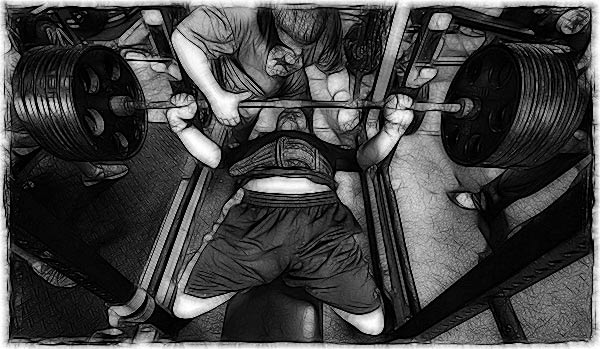A thought crossed my mind about why so few guys actually have truly big muscles. In the gym, it’s usually only 5-10% of people who really achieve success. But why is that? In my opinion, the essence lies in a few simple things. I’ll talk about them now and also give some good advice for those just starting out.
And what I saw was a quiet horror. No, just so you understand, the gym was normal. Just an ordinary “basement gym,” but the local “bodybuilders” surprised me a little once again.
One guy was doing some strange isolating exercises on the crossover machine, with a body weight of about 50-55 kg. Another spent an entire hour working on his abs, even though he was clearly an endomorph by body type. A third was doing barbell curls for his biceps, twisting and contorting so much that it seemed like we might need to call an ambulance for him. I saw enough, to say the least.
Of course, I didn’t say anything because people like that usually think they know everything themselves, and I just can’t afford to waste time and energy on pointless explanations.
What are the reasons that so few people have truly great, muscular bodies?
Bodybuilding for Beginners: Reasons for Failure
Right now, I don’t want to delve into complicated concepts. We will definitely cover more complex topics in future articles.
I believe that failures in bodybuilding (lack of growth, etc.) stem from fairly simple things. Even a small amount of muscle mass is already a success, but many people don’t achieve even that, remaining losers in the gym for life and becoming skinny thinkers.
In my opinion, here are the main reasons for failure:
- Misunderstanding the essence of bodybuilding.
- The desire to get everything quickly with minimal effort.
- A closed mind and unwillingness to accept new information.
Yes, someone might jump out of their seat and say, “But what about technique, the basics, heavy weights, etc.? Royals, it seems you’re off track yourself!”
Don’t rush to conclusions, friends. What I mentioned earlier is all very important. But these are just parts of what I’ve stated above.
Misunderstanding the Essence of Bodybuilding
The essence of bodybuilding is quite simple: you need to properly contract your muscles and increase the intensity of your workouts.
Proper muscle contraction is necessary to ensure that the load hits the target, i.e., the muscle group you are training.
For example, when you perform a bench press, your goal is to train your chest. Okay. You should focus on your chest muscles, paying attention to their contraction at every point in the barbell’s range of motion.
In short, your chest should never disengage during a set. If you don’t do this, the load might be stolen by the synergist muscles.
Synergist Muscles are muscles that perform the same contraction function.
For instance, in the case of the bench press, the synergist muscles would be: the chest, triceps, and the anterior deltoid.
If you don’t focus on your chest, the load will simply “spread” across your triceps and anterior deltoid, meaning your chest won’t receive the necessary load for growth.

I think it’s clear that you need to properly contract and feel your muscles. Check out this article for more detailed information on this.
Now, let me talk a bit about increasing workout intensity. Muscles have no reason to grow if the load doesn’t increase. It seems simple, right? But no, many people just grind their bodies year after year with the same weights, following the same training program, and expect different results. What nonsense!
Our body will never do something that isn’t beneficial to it! Building big muscles is a very energy-intensive process! It’s not beneficial to our body because it requires much more energy than before. And our body always strives to conserve energy because the less energy left, the greater the danger to life.
So, it’s clear that the load must increase. But the load should be specific, namely high-volume. The trick in bodybuilding is that a bodybuilder can perform a very large volume of work. This means we need to work within a certain repetition range. I’ll explain more about that later. Now, onto the next point.
The Desire to Get Everything Quickly with Minimal Effort
Well, this trait is common among Americans. The expectation that “maybe it’ll just work out”? We love a freebie; you can’t take that away from us.
Maybe I’ll buy this stupid weight-loss bracelet and it’ll actually work? Or maybe this ab-belt will really build my abs for me? Well, this weight-loss tea “CrapSlim” has got to help, right? And so on…
I had an article about various absolutely useless “super-effective products” for bodybuilding. It’s right here. I won’t repeat myself, or this article will never end.
I’ll just say that we get out what we put in. If you didn’t even get off the couch to do something useful, then you’ll get the same in return—nothing.
There’s also another problem. Beginners come to the gym and immediately start lifting weights that are way too heavy for their level of fitness. They strain, contort their faces like they’re having a stroke, but still try to curl a barbell with terrible form.
First comes technique, friends, then progressive overload. Go back and reread the previous point.
And of course, I wrote an article about the desire to get everything quickly right after I came out of anesthesia from surgery. There are some interesting thoughts in it. Read it if you’re interested. The article is here.
A Closed Mind and Unwillingness to Accept New Information
This point is also very important!
I believe that anyone who thinks they have found the ultimate truth has stopped developing!
A closed mind is when a person believes that their knowledge and opinion are the ultimate truth. As experience shows, such people never achieve success. And if you even try to suggest that they might be doing something wrong, they will glare at you with a look that could burn you to ashes.
I’m always open to hearing that I might be wrong or doing something incorrectly. That’s why I continue to grow. If I had a closed mind, I would have remained with a body weighing 73 kg and would have blamed my lack of progress on poor genetics, just like I did 5 years ago.
Don’t take everything people say at face value. You simply need to listen to those who look better than you or are more successful in something than you are. Perhaps you really are doing something wrong.
Now, I’ll highlight a few key rules that, in my opinion, you need to follow at the beginning of your training journey.
Rules for Beginners and Beyond
Yes, sometimes we forget the most basic things, so this information is also suitable for those who have been bodybuilding for a while.
Many people who work out in the gym think they are doing bodybuilding. In reality, they are engaging in physical exercise. There is a huge difference.
Those who engage in physical exercise don’t follow a daily routine, don’t progressively increase their loads, and allow themselves alcohol and cigarettes, believing there’s nothing wrong with it.
Bodybuilding, however, implies a clear athletic goal. In our case, it’s a beautiful, well-built, aesthetic body. To achieve this, you need to follow certain rules, which I’ll share with you now.
Exercise Technique
I can’t emphasize this enough. I’ve said it a thousand times already, but you must learn this, or you won’t see growth! I’m telling you the truth.
Bodybuilding for beginners is all about this. You need to learn how to properly contract your muscles. You should feel the muscle you’re training.
Here’s an article on how to learn to feel your muscles.
Progressive Overload
Muscles have no reason to grow if the load doesn’t increase! Remember, this is the main rule! The load can increase through heavier working weights, as well as by increasing the number of sets and repetitions.
The volume of your workout should increase. The greater the volume, the more muscle breakdown occurs, and the more muscle your body will need to build to compensate.
To monitor the growth of your workout volume, you’ll need to keep a training journal.

Working in the Right Rep Range
The most optimal “bodybuilding” rep range is between 6 and 12 repetitions.
What truly matters isn’t just the number of reps you perform, but the time your muscles are under tension! Research has shown that the optimal time for muscle failure to occur is between 10-30 seconds. When you select a weight that allows you to complete only 6-12 reps, you’ll hit this time frame.
Moreover, 6-12 repetitions are the most effective for inducing hypertrophy. This includes not only muscle cell hypertrophy but also sarcoplasmic hypertrophy, which allows you to “inflate” your muscles even more.
Work with Free Weights
For beginners, this is extremely important! Your muscles at the start of your training are not yet adapted to such loads, so you need to learn to overcome them. The more degrees of freedom the equipment has, like with barbells and dumbbells, the more muscles are engaged. This includes not just the prime movers but also the stabilizer muscles.
In the first months and years of training, you should focus on basic (compound) exercises. We’ve discussed the essentials in this article.
Sufficient Rest
Muscles grow during rest, not during workouts, so you need to recover well. This includes not only sleep but also proper nutrition.
A key point is that you need to train at the right time when your muscles have had enough rest but not too much. This concept is known as supercompensation.
The body is shocked by the load during the workout, repairs the damage, and then realizes that such a load might occur again, so it needs to prepare (by growing more muscle). It’s during the period of supercompensation that you should perform your next workout to make your muscles even bigger.
Here’s an article where I’ve explained in detail what supercompensation is.
Proper Nutrition
I always say not to think of nutrition as a diet because our bodies don’t like restrictions.
Throughout history, our species has had to survive in conditions of calorie scarcity, lack of warmth, social insecurity, and so on.
That’s why we enjoy getting some benefit from everything we do. Yes, it’s true. We’re all selfish, just to varying degrees.
So, you need to find a benefit in eating right! You should tell yourself that by eating well, you’re making yourself better, you’re becoming better than others, you’ll live longer, and so on.
It can be tough, especially for beginners, to figure out all these calories, nutrients, KETO, carb cycling, and other diets. So, here are a few general recommendations:
- Increase the amount of protein in your diet (meat, chicken, fish, eggs, cottage cheese, milk, kefir, etc.) and reduce the amount of carbohydrates, especially fast ones (sweets, baked goods, etc.).
- Drink more water. We discussed this here.
- Eat more frequently—6-12 times a day, in small portions. This will speed up your metabolism.
These are the most basic rules. But without them, you can’t achieve significant results.
Believe me, everyone with a well-built body has paid for it with certain sacrifices that made them who they are.
Your entire life is the result of your daily actions.
Postscript
People often ask me to post photos of my current shape. I think that’s justified because I also prefer to learn only from those who have achieved real results, not from those who offer empty excuses.
My body is almost ready for summer—there’s still a bit of extra fat, but that’s only because there’s still time (about 2-4 weeks), and I’m meticulously controlling the process. I try to lose weight very slowly, as this helps me retain more muscle while losing weight.
Losing weight is easy, but if you approach it carelessly, both muscle and fat will burn. You can’t fully preserve muscle, but minimizing muscle loss during cutting is the main goal.

